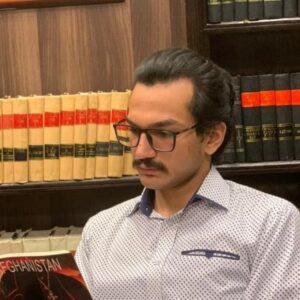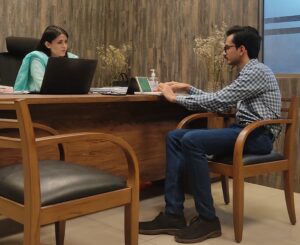“The Center for Positive Psychology is my conscious choice, and I am very ambitious about the potential impact of capacity building and cognitive training of individuals and society.” : Iram Irshad interview

Q: How did your journey start, and what are your current responsibilities?
Thank you very much, Country Today, for giving me this opportunity to share my life lessons. My professional career started almost 16 years ago; I have been very focused and committed to my personal growth. Along with my full-time job, I continued improving my academic resume to achieve my ambitions. My professional journey has been very rewarding both in terms of intellectual growth and experience of adult training. I was lucky enough to explore various dimensions of my interests; combining law with language added a diverse perspective to my profile. As a result, I could identify educational psychology as an intriguing subject, and eventually, I became a full-time practicing positive psychologist. I coach and counsel people both in groups and one-to-one basis. I design cognitive and emotional resilience interventions to help individuals unlock their past traumas and wounds to do well in the present life. I run the Center for Positive Psychology; a small research center on happiness and mental well-being. The Center for Positive Psychology is my conscious choice, and I am very ambitious about the potential impact of capacity building and cognitive training of individuals and society.
Q: What has been the driving force to make you reach the present status?
A: I am a curious and self-driven person. I have always had this immense desire to grow and do better. I am not a person who enjoys the status quo. I love setting goals and achieving them with complete devotion. Also, I am a staunch believer in continuous professional development, keeping regular track of the latest refresher courses and training programs to improve my knowledge and depth in my perspective. Love for learning keeps me on my toes.
Q: What were the barriers to your professional growth initially, and how did you fight them down?
A: Touchwood, I am blessed that I have never faced any professional hurdle per se. I believe my limitations were personal, fighting against my fears and narrow vision for myself. For instance, I wasted a good number of years hoping to achieve the approval of my significant others to validate my sense of judgement. Hence, I had personal barriers, but I could overcome them with the help of exposure and improved self-knowledge.

Q: We have known you for a while and noticed that you spread happiness. How?
A: I do not know if I spread happiness or not, but I know for sure that I have been spreading hope all my life. I try to encourage everyone around me. I am a very optimistic woman. I do not see that there is anything that can break a human being. Loss, rejections and failures are the best teachers, and we should not hesitate to learn from them. I try to teach hope in a way that we must keep walking. It takes time to figure out life and the right course of action. I push people for excellence and perfection only to get the maximum out of them. I know people can improve, people can change, and people can become the best version of themselves.

Q: While teaching, what methods do you adopt as today’s students are technically more advanced than teachers?
A: I have always adopted the Socratic method of teaching. I probe my students, making them think and decipher concepts and theories. Students with an active mind are fun to teach.
As a matter of fact, students these days don’t ask brilliant questions. The reason could be the easy availability of ‘Google’. Coming across an intelligent question is one thing that we, teachers, look for in a class and remain disappointed because students are generally stuck on achieving grades. Therefore, sometimes teaching becomes a dull business when you stay confined to shallow academic goals.
Q: How has COVID-19 affected the student-teacher interaction, and how do you deal with that?
A: I think it has affected this relationship and mentorship to a significant level. Everything has become so digital and mechanical. Although it is a blessing in disguise, surviving this pandemic could only be possible with the great help of the internet. Right now, at least we can access each other online. Something is better than nothing.
Q: How do you see the social behavior of the Pakistani public as a psychologist?
A: There are so many stigmas attached to psychologists. People are presumptuous and judgmental when it comes to the profession of psychology. Everybody looks for an easy solution or quick-fix to overcome decades-old wounds and pains. I find this profession very technical, akin to other fields such as law or medicine.
One of the most significant barriers as a psychologist is that people are not willing to help themselves. They are waiting for some “Khudayi Madad”. They expect psychologists to fix their cognitive issues overnight without personal effort.
The general public’s mindset regarding mental well-being needs revision with a more realistic and practical insight.
Q: Everybody has a different meaning of success in its dictionary. How do you define that?
A: My definition of success is elusive and ever-changing. Initially, my perception of success was conventional based on material achievement, but it is only one dimension of success. Material achievement is the first floor on which you get ready to experience higher order pleasures of life. For instance, consciousness, intellectual quest and spiritual enlightenment.
Finding a balance between your life in this world and the life hereafter means success to me. A point of acute awareness that your creator is your nucleus of life. Complete surrender in front of Allah gives the actual independence, peace and prosperity.
Q: What are your future plans?
A: My future plans are noble. I wish I could acknowledge and celebrate life more. I want to share it with young minds that life is not in ‘DOING’, but it is in BEING. I see myself as a teacher in the future years as well. I want to venture into teaching subjects of happiness and well-being. I wish to teach life skills to young minds that grade race and professional competitions are such small tasks for life skills. Shaping minds for mindful living seems a pursuit worth pursuing.
Q: How do you spend your leisure time?
A: I sketch and play the guitar in my spare time. I also love reading. Most people think that reading is taxing, but for me, it is a treat for mind. I love books. There are few people whom I regularly follow, like Elizabeth Gilbert is one of them.
Q: What is one of your favourite books which you think impacted your life?
A: There are so many, but if I have to name one, it would be “Alchemist” by Paulo Coelho. It is my all-time favorite. Every time I read it, I find a new lesson. I have read it over ten times, and surprisingly, I still get a fresh perspective on each new read.
Q: What message you want to give to our readers?
A: My all-time favorite message that I give to my audience is to try doing things that you love doing. Life is short, and we cannot do everything. So don’t waste your precious time on things that don’t charge you up and bring light in you. The sooner you realize, the better. Find your pull be it law, medicine or music, whatever it is. Figure out the place where your light lies and then get busy chasing your dreams.
Thank you very much, Country Today. It was lovely talking to you. I hope this little piece of insight will make people hopeful.
More Born deaf to reason





